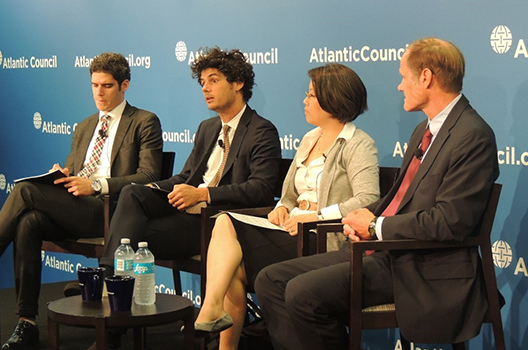 On September, 2016, the Eurasian Energy Futures Initiative hosted a panel on the book The Future of Natural Gas: Markets and Geopolitics. Nicolò Sartori, Senior Fellow at the Istituto Affari Internazionali, and co-editor of the book, provided an overwiew and discussed the development of LNG as a future reliable resource, diversification of energy supplies in Europe and Asia, and market forces driving the natural gas industry. Jane Nakano, Senior Fellow at the Center for Strategic and International Studies, highlighted Japan’s strategic importance for the LNG market, as well as Japan’s geopolitical issues with China, citing that two-thirds of LNG shipments pass through the contested South China Sea. She added that Japan is currently diversifying its energy needs with a prospective pipeline from Russia, nuclear restarts, coal imports, and LNG from Qatar, Australia, and the US. Lastly, Bud Coote, Senior Fellow at the Atlantic Council’s Global Energy Center, discussed the role US LNG development played in expanding global trade and connecting regional gas markets. He also discussed Russia’s role in the global gas market and its battle to maintain influence on market demand and prices.
On September, 2016, the Eurasian Energy Futures Initiative hosted a panel on the book The Future of Natural Gas: Markets and Geopolitics. Nicolò Sartori, Senior Fellow at the Istituto Affari Internazionali, and co-editor of the book, provided an overwiew and discussed the development of LNG as a future reliable resource, diversification of energy supplies in Europe and Asia, and market forces driving the natural gas industry. Jane Nakano, Senior Fellow at the Center for Strategic and International Studies, highlighted Japan’s strategic importance for the LNG market, as well as Japan’s geopolitical issues with China, citing that two-thirds of LNG shipments pass through the contested South China Sea. She added that Japan is currently diversifying its energy needs with a prospective pipeline from Russia, nuclear restarts, coal imports, and LNG from Qatar, Australia, and the US. Lastly, Bud Coote, Senior Fellow at the Atlantic Council’s Global Energy Center, discussed the role US LNG development played in expanding global trade and connecting regional gas markets. He also discussed Russia’s role in the global gas market and its battle to maintain influence on market demand and prices.
Following the remarks, David Koranyi, Director of Eurasian Energy Futures Initiative at the Atlantic Council moderated discussion. He addressed the panel on the following issues:
- The implications of LNG as a transition fuel.
- The European Union’s strategy to use LNG and the Nord Stream 2 pipeline’s interference with the EU’s energy strategy.
- Russia establishing gas links in Asia to counter Western energy diversity and sanctions.
Image: From left to right: David Koranyi, Director, Eurasian Energy Futures Initiative, Atlantic Council; Nicolò Sartori, Senior Fellow, Istituto Affari Internazionali; Jane Nakano Senior Fellow, Energy and National Security Program, Center for Strategic & International Studies; Bud Coote, Resident Senior Fellow, Global Energy Center, Atlantic Council
